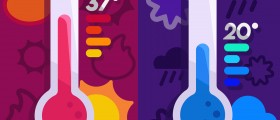Hypothermia does not have to necessarily occurs in extremely cold conditions it can occur whenever you are in damp and freezing weather.
Older people are more susceptible to hypothermia as well as young children. Hypothermia symptoms usually begin slowly. During development of hyperthermia you may have difficulties with thinking and moving. In fact, you may even be unaware that you need help.
If body becomes wet, cold, blown by a wind, exposed to subzero temperatures, exposed to blizzards, or in contact with cold metals, a hypothermia may occur.
In mild cases the usual symptoms are shivering, feeling chilly, not having enough energy, not feeling nice in temperatures higher than normal, or cold, pale skin.
The symptoms of moderate hypothermia include strong shivering, inability to think or pay attention, confusion (some people don't realize what is actually happening), you may loose judgment and reasoning, feeling scared, experiencing memory loss, having slow, shallow breathing and a weak pulse.
In extreme cases of hypothermia symptoms are not being able to feel your hands, feet, and limbs, uncontrollable shivering that that can stop abruptly, unconsciousness, shallow breath or no breath at all, weak, irregular or no pulse.
More often hypothermia occurs with the people who consume alcohol and have bad circulation because of the heart disease, who works outside during cold weather, those who are exhausted are those who have not eaten for a long time. If you plan to spend time or work in cold weather you should have good health and good body condition in order to prevent hypothermia.
People with hypothermia should be brought inside, dried, and warmed up by something, put near a heater but do this slowly because of the possibility of a shock and so get their body temperature up to normal. You can also give them something warm to drink. Someone with normal temperature should lie down under the blanket close to each other.
If going out you should protect your head, feet and hands and if you feel too hot in your clothes, remove parts of them until you feel well. Try to be near a warm building so you can go in to find shelter. If you must work outside or you like winter sports, when you get in, you have to change your clothes quickly. If the weather is very wet you should have layer clothing in order to keep your body dry.
Sometimes you cannot realise you are very cold. Pay attention not to get cold as you will not warm yourself easily. Sometimes the trouble is that the weather changes suddenly and you are not prepared on that.


















Your thoughts on this
Loading...